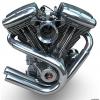Is this the "blood test" Sinclair is using? http://www.aging-us....cle/100968/text
From the paper:
The ensemble also identified the 5 most important markers for predicting human chronological age: albumin, glucose, alkaline phosphatase, urea and erythrocytes. ... The analysis of relative feature importance within the DNNs helped deduce the most important features that may shed light on the contribution of these systems to the aging process, ranked in the following order: metabolic, liver, renal system and respiratory function. ... Another interesting finding was the extraordinarily high importance of albumin, which primarily controls the oncotic pressure of blood. Albumin declines during aging and is associated with sarcopenia [23]. The second marker by relative importance is glucose, which is directly linked to metabolic health.
where albumin, BUN (urea), and hemoglobin/hematocrit (erythrocytes) are well-known measures of kidney (renal) function/aging, and where declining kidney function is strongly associated with cardiovascular disease. The relative importance of kidney aging is not discussed much in forums like this. Interestingly, in recent years kidney aging/decline has been associated with phosphorus and protein intake (and higher nutrient intake in general), but not with calories per se:
High dietary phosphorus intake is associated with all-cause mortality
https://www.ncbi.nlm...pubmed/24225358
In other words, to preserve kidney function over time, reduce the work they are asked to do, with the work load having more to do with specific nutrient processing than with calories (i.e., for the most part your kidneys don't care how much carb or fat you're converting to carbon dioxide and water). That fits well with the research showing that protein restriction has more to do with reduced aging than calorie restriction.
Kidney decline is also tied to NAD+ decline, so hopefully NR will help with that:
Role of NAD+ and mitochondrial sirtuins in cardiac and renal diseases
http://www.nature.co...eph.2017.5.html
So a strategy of NR supplementation + moderate P and protein (& other nutrient) intake + adequate calories may significantly reduce kidney aging.
(btw, P and protein tend to occur together in whole foods, so limiting one will usually limit the other)
































 This topic is locked
This topic is locked



























